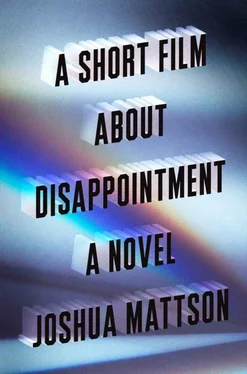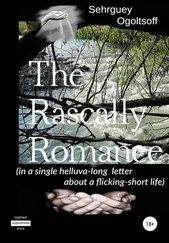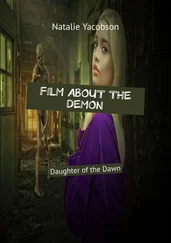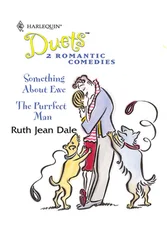Osvald has grown bolder. He is jealous of our filming, and when I am holding a camera, he will try to drop it or knock it over. He manages to knock it a bit askew, ruining the shot. Jonson has remarked on my clumsiness. We are two weeks from beginning photography on Altarpiece . Osvald hasn’t the forces for complete possession, but he can make filming a chore. My work, my sword and shield. May it chase him from me. Although I have become used to his presence. In some ways, it is a comfort.
Dozing on the couch, they look like Zurburán martyrs. They eat takeout. These are the moments of their most intense happiness and intimacy. While eating, they swap anecdotes about their lives at the office. One nods with vigor to compensate for their preoccupation with the carton of General Tso’s. Cannabis spray eases the tension of the workday.
On their couch the coin of their lives is spent. There is nothing to life but surrendering. As long as one continues to surrender, then one will be all right.
A self-contained unit, more or less. A shared complicity that doesn’t translate well to group situations. They pretend to enjoy each other’s families, fake delight at the visits of hoary friends, get drinks with sociopathic cousins, the family wolves. At the table with their new friends, who perceive them as a unit, they do a routine less savage than what Isabel and I trotted out.
When their friends ask how they met, Isabel makes a quip. As she does this, she cringes, dislikes herself. Osvald looks at the table. The friends respect them a little more for this ruthlessness. That decency inhibits fulfillment is an irony we have all had cause to reflect upon. The shy pride of betraying.
They overeat together, like prisoners horny for food. In our last summer, unwilling to take Isabel to the Dependence Day Parade, I suggested she ping Osvald that she was picking him up.
In four and a half hours, she returned, her belly a drum.
She said, I ate so much. It was glorious.
An implicit accusation floated over my scalp into the night beyond. Our kitchen window was open, the better to see the mawkish sunset so popular from the World’s Highest Terrace, where Isabel and Osvald had been swaddled in the breeze. The Désormière recording of Act Four, Scene Four, of Pelléas et Mélisande played, the scene at the well in the park, where Golaud dirties his hands. We must remember we are turning in light.
Chores go undone. Isabel runs her clothes to the Vietnamese dry cleaner. Osvald is not clean, although he is germophobic. He has to work harder in the relationship. He scrubs, tidies. He tries to keep their space clean. He fails. His junk proliferates. Isabel shoves aside woodworking tools, printer fodder, soldering irons, nanokits, bike spokes, textile samples.
The threat of me hangs over Osvald. The fear I might comb my hair, board a rail with their address on a wrapper. On my black horse with a rose in my teeth, to make a ridiculous dramatic gesture. To end his joy. Begging Isabel, who is so susceptible to gestures. I feel Osvald feeling this.
67.
BARGAINING WITH MAROAT
DIR. JAMES OSVALD
5 MINUTES
An old film of Osvald’s. You can’t see it.
Interior shot, our living room. A warped piano, pinups, vistas of terror and devastation torn from a pterodactyl coloring book, dying ferns, poster advertising Inquisitor , bust of Caligula, puncture in drywall from a pogo accident, paisley sofa, buff synth-leather love seat, soiled dishes, kliegs modified into lamps, the neighbor’s venial tortoiseshell cat, library books of translated poetry, of romantic etiquette, of fluorescence, of stain removal, of pagan magic, bottle caps, a stained harmonica, miniature skateboard, coffee mug printed with double entendre. What a treat, to see old things.
The film is not Osvald’s finest effort. A man enters. He flops on the sofa. His hand passes over the table, returns with the magic book. He is me, ten years younger.
In the book I am holding on-camera, Sabbath of Flowers , I read the surest way to get a person’s attention is to write their name while urinating. I went through a phase where I would scrawl Isabel’s name on glittering monticles of snow.
Flipping through the book, I roll my eyes, snap my fingers.
I say, Beard of goat, giraffe’s throat, to my sanctum come Maroat.
Off-camera, Osvald detonates a homemade smoke bomb. The damage from it cost us our security deposit. Out of the pansy fog steps Maroat, the Haggler. It is Osvald costumed in a jumpsuit and satin cape sewn from a bedsheet.
A note on Osvald’s dramatic method. To project depth, he visualized his conception.
The mystical aims of Bargaining with Maroat are tarnished by the continuous medium shot. Osvald lacked a DP, so a tripod had to suffice. He tried to sell the static effect as a metafictional conceit, but the film resembles a home movie more than a genre-bender, a thrilling Thursday shared by a real estate agent and a frazzled actuary in a quiet node motel.
One can cast curses with urine. While probably not effective, these actions function for the curser as a favored sports team may for the average person, as a dump for baleful feelings.
Maroat is prepared to grant me a boon for thirty years’ labor as his apprentice. I desire a woman, Orzsabet. I am not willing to work for her affections. This is within Maroat’s power, as is the ability to transmogrify ducks to swans, to make clouds heavy with blood, and to cause a man to believe his penis has fallen off. I can have Orzsabet for two months, two years, or two decades.
Maroat says, All relationships are finite. The strength of your ardor will be inverse to the duration of the partnership.
I choose.
Maroat offers me a game of chance. We will draw from a deck of Bicycles until one flips over the ace of diamonds. If he turns it over, he will receive Orzsabet when my period ends. If I turn it over, my period of servitude will be thirty days.
In my costume, I felt a tingling on my skin. On-screen, an attack of transposition. A bit of me slithered out my nostril. A bit of Osvald slithered in.
I don’t recall our wallpaper undulating like that.
Isn’t this fuchsia smoke effect far too advanced and, well, sinister for Osvald?
And what are these flashing violet lights seeming to transmit between Maroat and me, around minute six?
And what about this bloodshot eye overhead that I see only when I pause the film, the size of a beach ball, taking in the scene?
Shuffling, I ask Maroat what he did for his apprenticeship. He cuts the deck. He transcribed fragile manuscripts at the sticky carrel of his master, Carropos the Touchy. Before lunch, stomach whinging, he transliterated the wrong symbol. When Carropos attempted to cast a spell, he was sucked into the unknown. Maroat was free. We flip the cards. Two of clubs, eight of hearts, three of hearts, ace of hearts.
DIR. JAMES BUNCE
96 MINUTES
Tonight at Greye’s, I was accosted as I sat on a footstool in Subterranean Nonfiction, my favorite section. Greye’s is a secondhand bookshop organized by theme. The owner, a narcoleptic, finances his stock, bought in lots from defunct bookstores, by selling his mother’s vintage pinball machines.
It is a place to combat delative influences on one’s spirit. Third places, common areas discrete from home and work, are necessary to a healthy civic society. A third place without the insult of conversation is to be cherished.
In my section, on my stool. Examining a poster for Cometh Sobek , trying to remember if I’d seen the film, I became aware of a person standing over me with the fragrance of power.
Читать дальше












